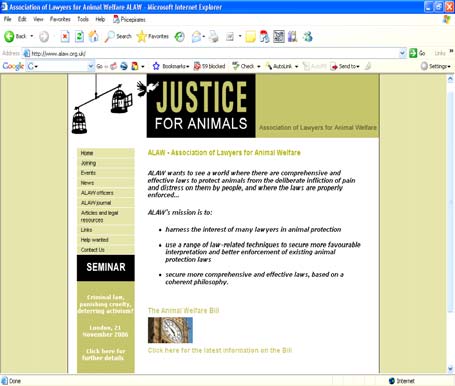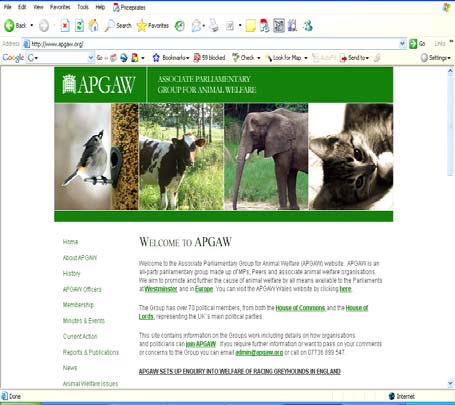Animal Rights & the
Future of the Pet Industry
(Presentation via Power Point)
Animal Rights & the Future of the Pet Industry
Chris Newman
3rd OATA Conference
|
I have been given thirty minutes to outline the threats posed to pet keeping and trade by the Animal Rights industry. Some of you may be surprised at the term industry, but that's exactly what it is - and a highly lucrative one at that.
I have just thirty minutes, but in reality in thirty hours I could barely scratch the surface, so this will be something of a whirlwind tour.
Many of the leading protagonists are not charitable organisations; they are businesses, limited companies. For example, Animal Aid is a multi-million-pound company and IFAW is a company with a turnover of some 25 million pounds, although to be fair it does also have a charitable arm. I'm not sure what this does, presumably raise more money!
ANIMAL WELFARE
(as defined by the American Veterinary Medical Association)
|
I will endeavor to define Animal Welfare,as opposed to Animal Rights, but things are not as straightforward as they may at first seem. AR covers a very broad spectrum.
Animal Welfare is, I would suggest, best quantified as the following:
"To prevent suffering and cruelty to animals."
To further define it here I have included a definition from the American Veterinary Medical Association.
ANIMAL RIGHTS
|
As I said Animal Rights is a very broad church, worshiped by a varied congregation.
There are, no doubt, many moderates who are most likely animal welfarists at heart rather than actual rightists. At the other end of the scale there are the fundamentalists who think Genghis Khan was too liberal!
I think the definition of AR philosophy is simple:
"To end all human exploitation of animals"
What is less clear is what defines exploitation!
|
So what is exploitation?
Raising and slaughtering of livestock for consumption, hunting, using animals for medical or veterinary research, zoos, circuses, animal shows horse racing, & performing animals are all considered exploitation.
But increasingly on the agenda is keeping of pets.
Animal Aid, for example, is happy to publicly state their opposition to pet keeping -
"We don't agree with pet keeping"
"Pets aren't a good idea"
"They become slaves to their owners"
Who's against the Pet Industry Animal Aid PETA CAPS APA IFAW RSPCA
|
There are literally hundreds of organisations which are either overtly, or covertly AR orientated.
They cover a broad spectrum, from Animal Aid the
self proclaimed largest AR group in the UK, to the RSPCA which now has clear AR philosophy, I would suggest.
The organisations listed here are some, but not all the key players. All of these organisations are opposed to the pet trade and pet keeping.
All of these organisations also have very close links with each other. Networking is the key to the success of the AR Industry.
|
Animal Aid claims to be the UK's largest animal rights group, with over 20,000 supporters, and one of the longest established in the world.
They claim to peacefully protest against all forms of animal abuse and promote a cruelty-free lifestyle, to investigate and expose animal cruelty.
It claims to be an entirely peaceful organisation that denounces the use of violence, but an incident back in 2001 appears to link Animal Aid with threats of violence and firebombing against a venue that was prepared to allow an animal show to take place.
In terms of AR organisations Animal Aid is the most proactive against the pet trade and pet keeping.
|
From Animal Aid web site:
Following a 3-year campaign by Animal Aid, Focus Do It All stores have ceased selling animals, it continues -
The corporation first promised to wind down its pet departments in July 2003 and two years later, we have finally received official confirmation that the phase out is complete!
Focus' Corporate PR Manager letter dated 25 April 2005 reads:
"I can confirm that livestock sales ceased on the 10th September 2004."
|
Again from Animal Aid web site:
Following a 16-month campaign by Britain's largest animal rights group Animal Aid, Wyevale Garden Centers has announced a new policy decision to stop selling live animals in its stores.
Says Andrew Tyler, Animal Aid Director:
"So far, there is no announcement to phase out the sale of ornamental fish, by concessionaires operating within the company's stores. Animal Aid will be pressing Wyevale to stop these sales too. After all, fish are animals and are deserving of the same level of care and consideration"
|
||||
The October issue of Pet Business World covered the recent pull out of pets by Wyevale.
If you haven’t read the article you most certainly should! However, here are just some of the key points from Kelly Slade campaigns officer for Animal Aid.
So, Focus down, Wyevale, down - who’s next? ‘Notcutts next’ as suggested? I suspect not.
Obviously the major prize would be Pets at Home, which some of you may think is an impossible target. I recall other erstwhile purveyors of pets saying just that, so I remain pragmatic.
|
A brief look at some of the other players.
CAPS, Captive Animal Protection Society.
Another limited company, although recently formed a charitable arm, which I suspect will be a growing trend.
CAPS are largely perceived as being against circuses and zoos, but are equally involved in anti pet keeping campaigns.
They are currently leading the campaign against the NIRAH project.
|
Animal Protection Agency, APA.
This is a splinter group from Animal Aid, run by the delightful Elaine Toland, former senior campaigns officer for Animal Aid.
Its prime agenda is the pet trade. They are politically very active as you can see from the front page of their web site.
APA is linked to many dubious organisations such as SARC.
|
IFAW, International Fund for Animal Welfare, a global organisation. This is largely seen as a cuddly welfare organisation, but in fact they have huge political influence.
IFAW also has huge financial clout. On the matter of links, Dr Richard Ryder, member of the Ruling Council of the RSPCA is also parliamentary consultant to the Political Animal Lobby, PAL, which is a wholly owned subsidiary of IFAW.
In 1997 PAL donated over a million pounds to the Labour party. PAL is is run by Angela Beveridge, sister of the late Labour Lord Tony Banks.
After successfully lobbying for the hunting ban, IFAW is looking with interest at the pet industry.
|
The Royal Society for the prevention of Cruelty to Animals, RSPCA, is the oldest animal ‘welfare’ organisation in the world, founded in 1824.
The RSPCA has huge financial resources; the charity has an income of around 100 million pounds annually and assets of over 160 million – big money!
It is unarguable that the RSPCA does some good work, however, over the last 20 or so years the charity has lost its way, I would suggest.
The RSPCA is an organisation driven by prosecutions, which are taken for financial & political objectives. My view is that all RSPCA prosecutions are unsafe and ultimately they must be forced to work through an independent prosecuting authority.
It would be my suggestion today that the RSPCA be renamed the “Royal Society for the Persecution of Animal Keepers”
|
||||||
In 1999 the RSPCA wrote to every Local Authority in England a Wales, stating:
"The RSPCA is opposed to the sale of animals from pet shops”
The RSPCA have subsequently denied this is policy, yet despite persistent calls from them to retract this letter they have refused to do so.
All they have offered is carefully worded letters of explanation to imply this was a mistake and not policy.
However, their own Policy Document also states their opposition to the sale of animal from pet shops, garden centers et al.
|
||||||
On the subject of the Policy Document, a couple of years ago it was suggested that I read it as I might find it interesting!
I asked for a copy, to be told they didn’t have one! I was initially told it was out of print and the given a multitude of other reasons why I couldn’t have one.
In the end I was invited to a meeting at Horsham where I was shown a copy, actually just the cover, but told I could not have a copy nor could I read it!
This quote is the general principles upon which the RSPCA work; I would suggest this statement clearly places animal rights above that of human rights!
|
For the sake of brevity I shall not dwell in detail on the various policies now, but I have just highlighted a few that I find of concern, although there are many to choose from.
Recently the RSPCA have been forced to make the document publicly available from their web site.
The 64 page document makes an ‘interesting read’, I would urge you all to do so thoroughly.
Having read the document cover to cover, many times, it is my opinion this is a Policy of Animal Rights, not Animal Welfare. There is clear opposition to pet keeping and the pet trade:-
“……caged animals do not generally make good pets” As we can define the aquarium as a “cage” then that includes fish!
|
||||||
At the launch of this report, which incidentally should have been entitled ‘a disingenuous look at the exotic pet trade, I was ejected from the press conference that I attempted to gate crash by RSPCA Superintendent Tim Wass.
We stood in the streets having verbal fisticuffs for a couple of hours, until eventually Tim said “Why are we arguing? We agree on more things that we disagree”.
It was suggested that we enter into a Memorandum of Understanding to work together to improve welfare of reptiles.
The MoU was proposed by the RSPCA, drafted by their legal department, but the Ruling Council refused to allow the inspectorate to sign it - no explanation was given!
|
Shortly after the rejection of the MoU, REPTA met with senior RSPCA personnel at the headquarters in Horsham. I asked John Rolls [Director of Animal Welfare Promotion] if he would confirm or deny that 18 out of the 25 members of the Ruling Council were members of Animal Aid!
His response, far from denial, was it doesn’t matter if they are; it’s not a conflict of interest
Why do I think this is such a critical issue?
Council members, as charity trustees, are legally responsible for the effective use of the Society’s resources in accordance with the objects of the RSPCA and also for providing leadership and direction in all the affairs of the Society.
|
Earlier I mentioned networks, or associations, of AR organisations. A group local to myself is SARC, Southern Animal Rights Coalition, a regional, but very proactive group.
Like most groups SARC campaign/act against a variety of issues, recently focusing on pets.
They also campaign against vivisection, experimentation, furs and are very proactive in releasing wild boar from farms.
Their interests in pets started with supporting the Animal Protection Agency’s campaign against pet fairs, or rather bird shows.
|
Headlines to this story are:
“Animal rights activists spared jail”
The Daily Telegraph Friday 18th August 2006“Four animal rights extremists who stole hundreds of birds, rodents, rabbits and dogs from an animal breeder were today spared jail”
The background to this is becoming not an uncommon occurrence. The AR fundamentalists decided it was inappropriate for the pet shop owner, Mr Porter, to continue in business at his licensed pet shop, so they stole his breeding stock!
The court heard that "prime mover and organiser" Sarah Whitehead, a nurse, was informed by friends linked with the RSPCA in May last year that animals were being kept in poor conditions, with insufficient water and food. I understand subsequently the RSPCA have denied any knowledge!
|
Moving on from organisations lets look at a couple of activists so we can understand the kind of people involved.
Keith Mann was described by a judge as a “ruthless fanatic” when he was sentenced in the mid-1990s to a 14-year jail sentence for a terrorist-style campaign of sabotage against the meat and poultry trade.
Back in 2004 after I acquired a copy of the RSPCA Policy Document, at the same time someone made a web site of it, but naturally I have no idea who!!
In response a gentleman, who I cannot name, from an organisation which I cannot name, posted my home address on a web site. Within 24 hours animals kept in my garden had been killed. It is thought Mr Mann may well have some knowledge of this and some of the other six incidents at my home.
|
Mr Mann was recaptured after ten months on the run, when he was found working at a cat sanctuary in East Sussex under an assumed name.
The sanctuary was operated by Celia Hammond, a member of the RSPCA Ruling Council!
Ms Hammond pleaded on Mann’s behalf at this court hearing, as I recall describing him as a thoroughly decent chap!
Ms Hammond is still a member of the RSPCA Ruling Council, from which I can only conclude that the RSPCA consider it appropriate for Council members to support terrorists of this nature!
|
Robin Webb acted as spokesperson for the ALF while serving on the Ruling Council of the RSPCA.
He only resigned after it became public knowledge.Today Webb still runs the Animal Liberation Press Office.
In a Channel 4 Dispatches program, Webb appeared to offer advice on how to make a bomb. The film makers had secretly filmed Webb holding meetings with an individual who told Webb he wanted to arrange a bombing, but who was in fact working undercover for the production team.
|
Moving on: Association of Lawyers for Animal Welfare
ALAW’s mission is to:
Harness the interest of many lawyers in animal protection
Use a range of law-related techniques to secure more favorable interpretation and better enforcement of existing animal protection laws
Secure more comprehensive and effective laws, based on a coherent philosophy.
ALAW was founded by several serving members of the RSPCA ruling council and I would suggest exploits legal loopholes to further RSPCA objectives. For example, the recent Judicial Review against Pet Fairs. The AR Industry had always declined to fund such an action, so funds were procured from the public pocket via Legal Aid.
|
The Associated Parliamentary Group for Animal Welfare, APGAW.
APGAW is an all party group for MPs and Peers with an interest in Animal Welfare. It is a very proactive group which meets regularly to debate issues of animal welfare and to lobby government.
APGAW is in principle a worthy organisation, but it is entirely funded and staffed by the RSPCA.
My concern is that it has been unwilling to hear debates that its funders do not want heard. For example, in March 2005 we were to debate the issue of Pet Fairs, but after initially agreeing to the debate the likes of Animal Aid all pulled out the week before,so APGAW cancelled the meeting. A few months prior to this they showed no such reticence when Birds First made an unchallenged presentation against pet fairs.
|
The Animal Welfare Bill completed its parliamentary path earlier this month, becoming law in April 2007.
Unless pet keepers and the pet industry recognises and starts to address the threat posed by the Animal Rights industry within a decade the retailing of pets from pet shops will be consigned to history.
Within two decades the keeping of companion animals, pets, will be to all intents and purposes will be finished.
If we ignore this threat, or treat it with the usual apathy, we shall follow the plethora of other species into extinction.
What do we need to do!
|
So what do we need to do? First and foremost we must acknowledge the threat, not simply bury our heads in the sand and say “it will never happen” - it will, it is!
We also need to be united, keepers, traders and trade associations.
We need to redress the political imbalance, under the Animal Welfare Act. Remember all codes of practice, which underpin the Act, must be debated by parliament!
Those who oppose the pet industry and pet keeping, RSPCA, IFAW, RSPB etc, all have political lobbying departments. There are at least ten full time political lobbyists opposed to our interests, whilst we have not one!
Our future is in our hands. We have a duty of care to the animals which we keep, but we also have a duty to safeguard future generations’ rights to keep pets.
Animal keeping is not a privilege it is a right, as it is our right to be free.
Society can remove our rights, but only if we transgress the law.
We cannot afford to allow the AR industry to dictate the law or our rights.
Download the above presentation as an Adobe pdf
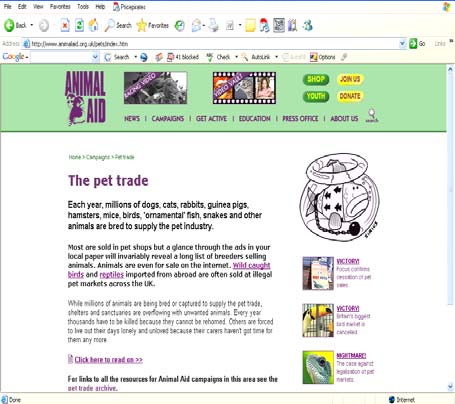
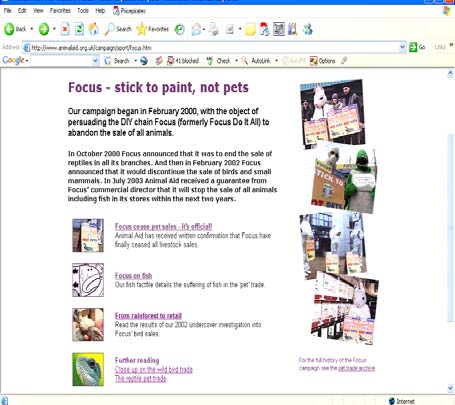
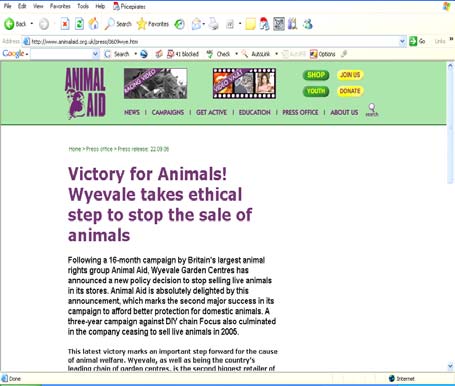
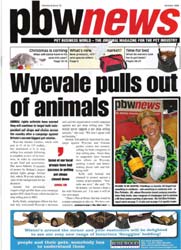
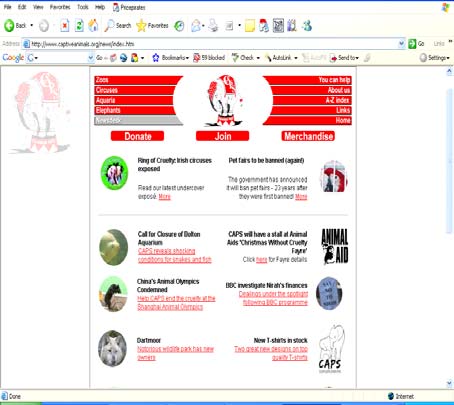
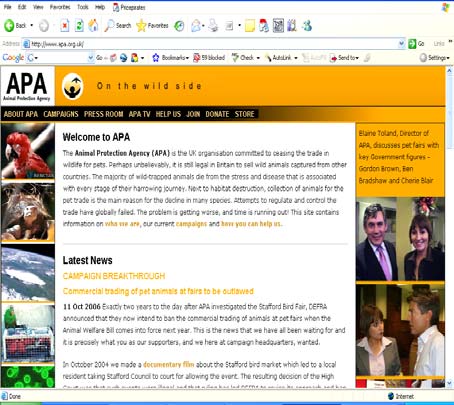
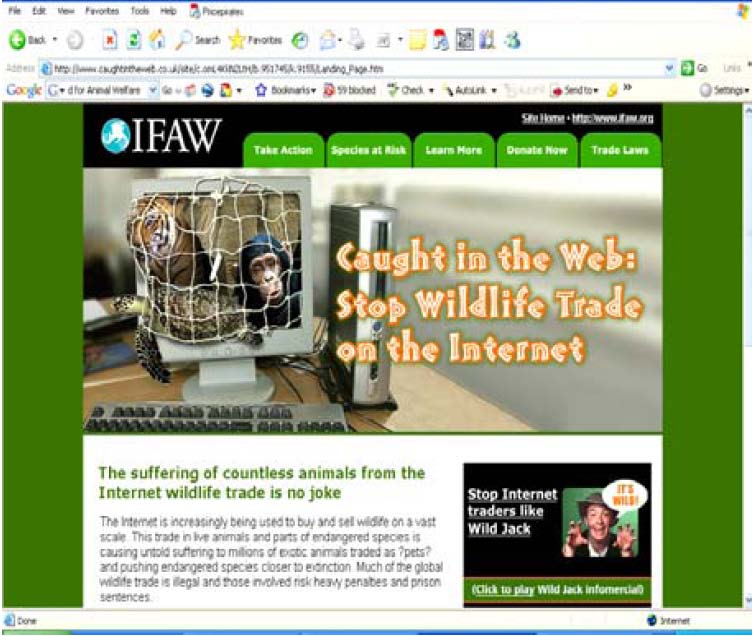
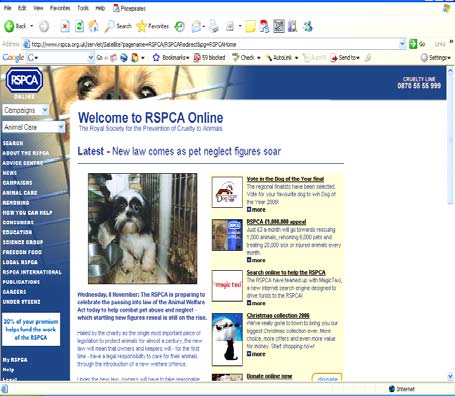
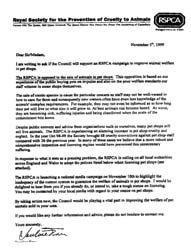
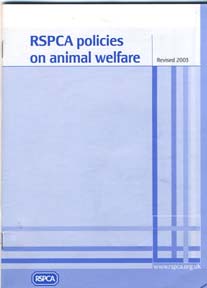
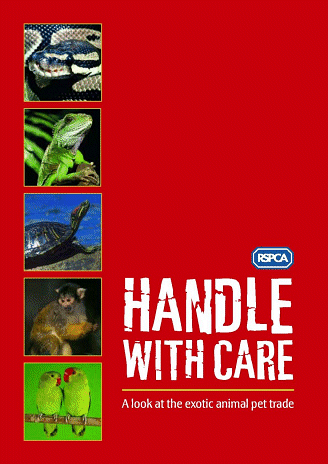
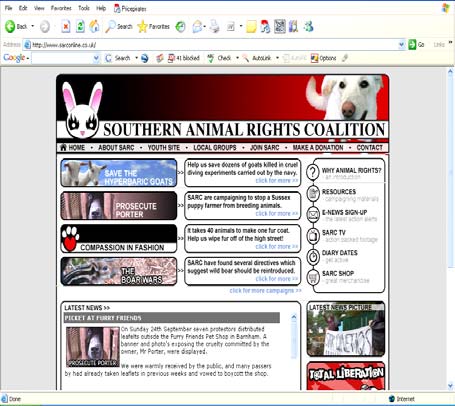
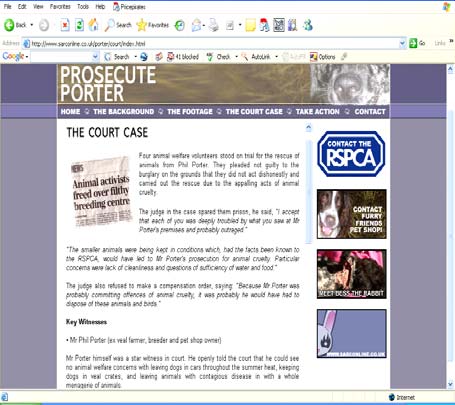
 campaigner, believed to be a senior Animal Liberation
Front activist. He was first jailed 1992 in connection with an attack on the home of a fox hunter.
In 1994, he was sentenced to 14 years in jail
for possession
of explosive substances, incitement, criminal
damage, criminal damage, and escape from custody.
campaigner, believed to be a senior Animal Liberation
Front activist. He was first jailed 1992 in connection with an attack on the home of a fox hunter.
In 1994, he was sentenced to 14 years in jail
for possession
of explosive substances, incitement, criminal
damage, criminal damage, and escape from custody. Press Office in the UK. He was previously a member of the ruling council of the RSPCA and a director
Press Office in the UK. He was previously a member of the ruling council of the RSPCA and a director